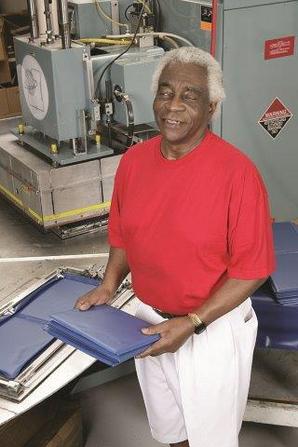By Jennifer Kalish
EDITORIAL INTERN
Published: September 23, 2013 4:11 pm ET
Updated: September 23, 2013 4:18 pm ET

Image By: Dallas Lighhouse for the Blind Inc.
Oliver Smith, who works in Dallas Lighthouse's binder department, drove a truck for 30 years before losing nearly all of his sight to a disease that damaged his retinas.
Blake Lindsay was only 9 months old when he lost his sight completely. But despite all the challenges he's faced as a result of his condition, he has never let his blindness define him.
"I never really lived in a blindness world that much," Lindsay said in an interview. "I was a radio guy for about 22 years. I got an early start when I was 15 years old, and worked at KISS FM in Dallas and different stations."
Now Lindsay works as a communications manager at Dallas Lighthouse for the Blind Inc., a nonprofit agency that provides employment opportunities to blind and visually impaired individuals in various industries — among them, plastics manufacturing.
While there is no doubt that there are many people like Lindsay who find fulfilling careers in various industries despite their condition, that isn't the norm for most blind Americans.
In fact, more than 70 percent of working-age blind adults are unemployed, according to a 2012 annual report from the National Federation of the Blind, based in Baltimore.
A likely contributor to the high unemployment rate among blind adults is the misconception by both employers and blind individuals themselves that they aren't capable of working in certain industries.
Nevertheless, Dallas Lighthouse, along with the 91 other agencies associated with the National Industries for the Blind nationwide, have been working for decades to bust that myth.
"It's like a first-rate support group, especially for somebody who's lost their sight later in life," Lindsay said of Dallas Lighthouse. "[Blind employees] have mentors all around them and people rooting for them, and they come to the realization quickly that they can work again."
Through its associated agencies, Alexandria, Va.-based NIB helps blind individuals get job training and employment in various fields, from business services and sales to sewing and manufacturing.
Dallas Lighthouse is one of three NIB-associated agencies that does injection molding, the others being LC Industries Inc., headquartered in Durham, N.C., and Seattle Lighthouse for the Blind in Washington state.
LC Industries, the largest nonprofit employer of blind labor in the U.S., has 22 injection molding machines, according to the company's website. Seattle Lighthouse, which also uses blind and deaf-blind labor to manufacture aerospace parts for Boeing, has 11 injection presses, said Pat O'Hara, vice president of operations for Seattle Lighthouse.
Many of the products those three agencies make are contracted through the AbilityOne Program, which sets aside contracts for nonprofits to manufacture products for the federal government such as military tools and office supplies.
"We have five injection molding machines; our largest machine is a 450-ton, and then our smallest, I believe, is a 210-ton," said Nancy Perkins, president of Dallas Lighthouse.
"Most of our revenue comes from our manufacturing operations."
Using about 75 percent blind labor, Dallas Lighthouse makes various injection molded, heat-sealed and sewn products for military purposes like canteens and entrenching tools, as well as commercial products such as markers and highlighters.
Dallas Lighthouse is retooling three of its five presses for a new marker and highlighter line, Perkins said.
Though to some, a blind person operating an injection molding machine may seem precarious, the agencies' success in manufacturing confirms the ability of blind labor to excel in challenging work environments.
"When people work in the same place every day they become very familiar with their surroundings," she said. "Our supervisors who manage those production lines are the ones who are responsible to make sure that everybody understands what their job is, so they always have help and they always have somebody they can go to if there's any confusion.
"But once they know what's expected, they're just like anybody else and they can function very, very well, and they do."
Additionally, Perkins said, their blind and visually impaired employees are trained to succeed at any company within their chosen industry, not just at Dallas Lighthouse.
"We're not a sheltered workshop," she said. "This is considered competitive employment. In other words, if they went to another town and somebody had an injection molding press, they would be able to do that work."
For many blind or visually impaired individuals, however, the hardest part is simply admitting to themselves that they in fact are capable of excelling in a particular industry.
"[Blind] people need to be more open-minded about opportunities and go ahead and accept them if they're capable of doing them," Lindsay said.
"They'll be grateful later, on many levels." | 